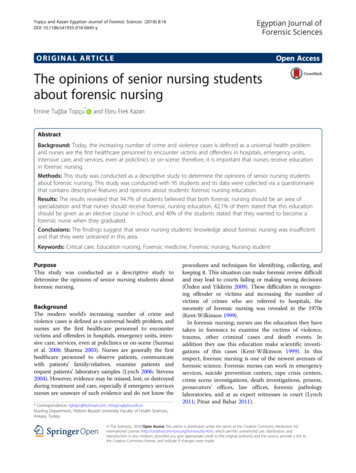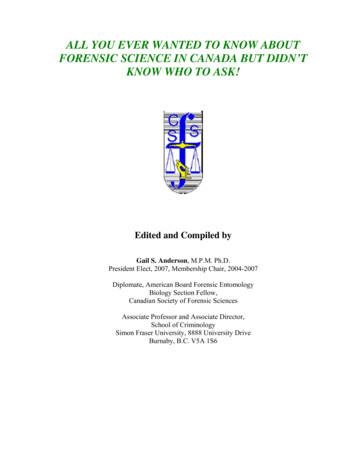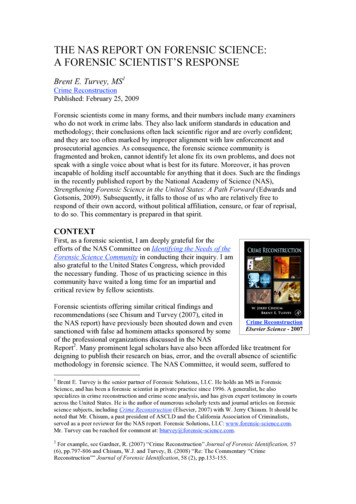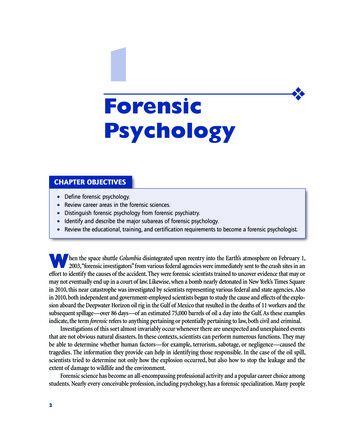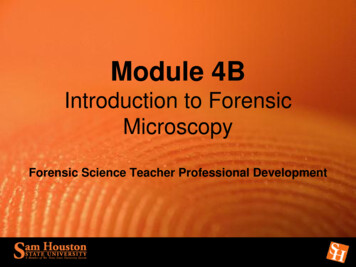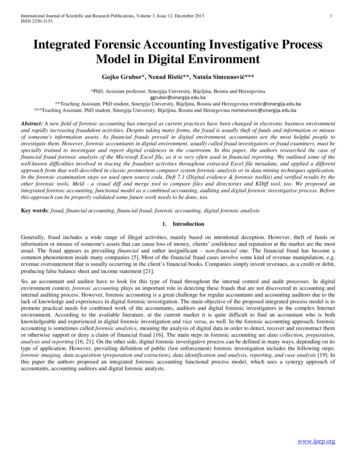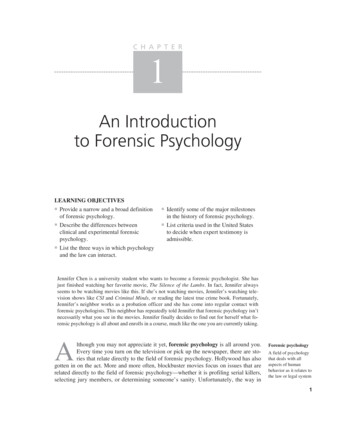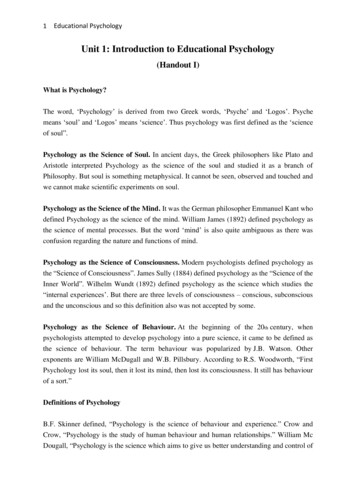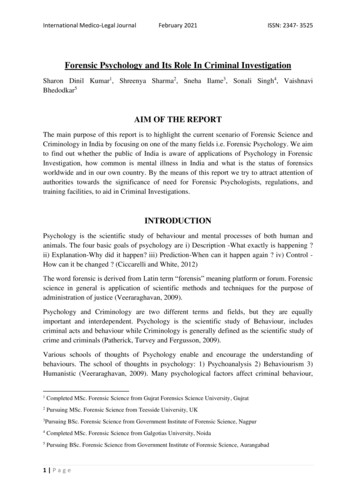
Transcription
International Medico-Legal JournalFebruary 2021ISSN: 2347- 3525Forensic Psychology and Its Role In Criminal InvestigationSharon Dinil Kumar1, Shreenya Sharma2, Sneha Ilame3, Sonali Singh4, VaishnaviBhedodkar5AIM OF THE REPORTThe main purpose of this report is to highlight the current scenario of Forensic Science andCriminology in India by focusing on one of the many fields i.e. Forensic Psychology. We aimto find out whether the public of India is aware of applications of Psychology in ForensicInvestigation, how common is mental illness in India and what is the status of forensicsworldwide and in our own country. By the means of this report we try to attract attention ofauthorities towards the significance of need for Forensic Psychologists, regulations, andtraining facilities, to aid in Criminal Investigations.INTRODUCTIONPsychology is the scientific study of behaviour and mental processes of both human andanimals. The four basic goals of psychology are i) Description -What exactly is happening ?ii) Explanation-Why did it happen? iii) Prediction-When can it happen again ? iv) Control How can it be changed ? (Ciccarelli and White, 2012)The word forensic is derived from Latin term “forensis” meaning platform or forum. Forensicscience in general is application of scientific methods and techniques for the purpose ofadministration of justice (Veeraraghavan, 2009).Psychology and Criminology are two different terms and fields, but they are equallyimportant and interdependent. Psychology is the scientific study of Behaviour, includescriminal acts and behaviour while Criminology is generally defined as the scientific study ofcrime and criminals (Patherick, Turvey and Fergusson, 2009).Various schools of thoughts of Psychology enable and encourage the understanding ofbehaviours. The school of thoughts in psychology: 1) Psychoanalysis 2) Behaviourism 3)Humanistic (Veeraraghavan, 2009). Many psychological factors affect criminal behaviour,1Completed MSc. Forensic Science from Gujrat Forensics Science University, Gujrat2Pursuing MSc. Forensic Science from Teesside University, UK3Pursuing BSc. Forensic Science from Government Institute of Forensic Science, Nagpur4Completed MSc. Forensic Science from Galgotias University, Noida5Pursuing BSc. Forensic Science from Government Institute of Forensic Science, Aurangabad1 Page
International Medico-Legal JournalFebruary 2021ISSN: 2347- 3525according to various psychological theories, when a person does an act it is the reflection oftheir own thoughts and feelings. Problems in the thought process give rise to criminalbehaviour and many various reasons may include committing a crime like greed, revenge,jealousy, anger, or pride (Bartol and Bartol, 2008).Forensic psychology covers all the aspects of psychology which are relevant to the wholelegal and criminal process , here we apply the psychological principles and knowledge tovarious legal activities from crime against children , in case of child abuse ,child custodydisputes to assessing the mental and physical conditions of a person ability and competencyto stand trial, to advise judges in matters relating to sentencing to name a few(Veeraraghavan, 2009).As per the American Psychological Association (APA) ,2000. “Forensic psychology is theprofessional practice done by the psychologists in the area of clinical, counselling, neuro andschool psychology, when they are engaged regularly as experts and represent themselves assuch. Mainly to provide professional psychological expertise to the judicial system.”(Veeraraghavan, 2009)The American Board of Professional Psychology (ABPP), defines forensic psychology as“Application of science and profession of law to questions and issues relating to psychologyand the legal systems.”It draws attention towards diverse disciplines such as law, sociology, political science,anthropology, philosophy, medicine, and linguistics (Veeraraghavan, 2009).Forensic psychologists have indeed various responsibilities in the Criminal justice system.The roles played by them can be broad and varied. Forensic psychologists provide information and advice to officials in the legal systemsuch as lawyers/judges.They act as expert witnesses.Diagnose and treat criminals within the prison system.They administer psychological tests to criminal defendants.Forensic psychologist may help either the prosecution or defence in a trial by helpingdetermine which potential jurors (Ciccarelli and White, 2012).As we look into we can see that forensic psychology includes all services of psychologicalnature as applied to the legal system and legal requirements .Psychology helps us tounderstand criminals and criminal behaviour ,without understanding the psychology of crimeit is not possible to give proper judgement to any of the case (Veeraraghavan, 2009).Specific areas of work where forensic psychology includes: Divorce and child custody mediation Determining insanity of a person and competency to stand trial. Jury selection and case strategy Expert opinion/testimony on questions of psychology nature. Psychology testing and evaluation2 Page
International Medico-Legal JournalFebruary 2021ISSN: 2347- 3525 Assessment of danger (in sexual predators’ law).Selecting and placement of police officers, security, and military personnel.Explaining effects of psychological conditions and illness on a person.Designing and conducting treatment programs for offenders and people at risks.Preparing criminal profiles of various offenders.Providing counselling and psychotherapy services to individuals involved with thecriminal courts. Counselling of juveniles and adults on probation. Handling of individuals who violate restraining orders. Dealing with victims of crime and persons awaiting trial. Examination of cases of sexual offenders and use anger management skills for violentoffenders.Forensic psychologists handle both criminal and civil cases in court of law thereby providingpsychological expertise to the judiciary. As in the court room they just do not ask thepsychological questions, but they ask the legal questions so as to make sure that the mentalinformation of the person is within legal framework and for this they work from micro tomacro level. The forensic psychologists’ reports are used in deciding the sentence to bepronounced in regard to the accused (Bartol and Bartol, 2008).BACKGROUND AND GROWTH OF FORENSIC PSYCHOLOGYIn 1879 Wilhelm Wundt, often called the father of psychology found the world’s firstpsychological laboratory in Leipzig in Germany where was the first seeds of forensicpsychology planted. In 1893 James McKeen Cattell conducted some of the earliest researchon the psychology of testimony. He also inspired many other psychology experts to conducttheir research in eyewitness testimony which further raised serious issues about its validity ina court of law. Alfred Binet replicated Cattell’s research and helped to find the firstpsychological laboratory in France at Sorbonne, Paris in 1889.Louis William Stern of Germany established the first journal on the psychology of testimony(Beiträge Zur Psychologie der Aussage [Contributions to the Psychology of Testimony])which was published in Leipzig in 1903. This journal was replaced in 1907 by the muchbroader Zeitschrift für Angewande Psychologie (Journal of Applied Psychology), edited byStern and his associate Otto Lipmann. Psychology Applied to Legal Evidence and OtherConstructions of Law was published by George Frederick Arnold in 1906.In 1908 the German-American psychologist Hugo Munsterberg published ‘On the WitnessStand’, arguably one of the first professional books on Forensic Psychology.Psychologist Grace M. Fernald and psychiatrist William Healy established Clinic for juvenileoffenders in 1909. One of the earliest psychologists to testify in a criminal trial, held inBelgium was J. Varendonck in 1911. In 1913 psychologist Eleanor Rowland offered3 Page
International Medico-Legal JournalFebruary 2021ISSN: 2347- 3525psychological services first time within a U.S. correctional facility. In 1917 the first“polygraph” was developed by Psychologist-lawyer William Marston which was rejected bya federal court (Frye v. the United States, 1923) because the polygraph lacked generalacceptance by the scientific community.Psychologist Louis Terman was the first American psychologist who used psychological testsin the screening of law enforcement personnel in 1917. In 1918 the New Jersey Departmentof Corrections established the first inmate classification and became the first state to hire fulltime correctional psychologists regularly. In the case of “State v. Driver, 1921” an Americanpsychologist first time testifies as an expert witness in a courtroom. In 1922 Karl Marblebecomes the first psychologist to testify at a civil trial. The primary state to producecomprehensive psychological examinations of all admissions to its prison system and everyapplication for parole was Wisconsin in 1924.Howard Burtt’s Legal Psychology published his first textbook in the forensic area by 1931 asa psychologist. In the landmark 1954 case of Brown v. Board of Education, the U.S. SupremeCourt cites social science research. D.C. Court of Appeals recognized psychologists asexperts on the issue of mental illness in Jenkins v. the United States in 1962. The book Crimeand Personality written by psychologist Hans J. Eysenck in 1964 formulates a comprehensiveand testable theory on criminal behaviour. Martin Reiser, the first police psychologist withinthe United States employed by the Los Angeles Police Department in 1968. The Universityof Illinois established the first PsyD program in 1968.In 1972 under the guidance and leadership of the American Association for CorrectionalPsychology (AACP), correctional psychology becomes recognized as a professional career.In 1973 at the University of Nebraska–Lincoln the first successful interdisciplinarypsychology and law program was developed.In 1978 the American Board of Forensic Psychology provides board certification in forensicpsychology and the APA approves a clinical post in corrections at the Wisconsin Departmentof Corrections. In 1991 the American Academy of Forensic Psychology and AmericanPsychology-Law Society (Division 41 of the APA) publishes Specialty Guidelines forForensic Psychologists.Forensic psychology was acknowledged as a specialty by the American PsychologicalAssociation in 2001 that is reaffirmed in 2008. The Specialty Guidelines for ForensicPsychology are revised, renamed, and published in 2013. Police and Public SafetyPsychology (PPSP) acknowledged by the American Psychological in 2013.HISTORY OF FORENSIC PSYCHOLOGY IN INDIAThe growth of forensic psychology began in the year 1917 when Prof. Prafulla Chandra Bosewrote a thesis on how forensic psychology must be used in understanding criminals and theirbehaviour. He gave the idea that one cannot give judgment in any case without understandingthe crime that has been committed.4 Page
International Medico-Legal JournalFebruary 2021ISSN: 2347- 3525For instance, in the Mental Health Act 2012, regarding the crime the crimes committed bymentally ill persons who labelled as insane were sent for treatment to the hospital.The first lie detection division was set up at the Central Forensic Science Laboratory (CFSL)of the Central Bureau of Investigation (CBI) by 1968. In the very beginning, there were noproper training centers’ for professionals to be trained for lie detection. That time to conductthe lie detection tests they followed the procedures and methodologies described by Reid andInbau in the book “Truth and Deception: The polygraph (lie-detector) technique” publishedin 1966. Since 1972, many forensic science laboratories had been started polygraph machinesin various states of India.While the forensic psychology department as such by name was not established in many stateFSL’s instead many FSL had Lie Detection Division in which polygraph was used. Dr. S.L.Vaya conducted the first narco-analysis authorized by the court in 1989. But this was againstthe person in question. Later many more innovations had been taken place in the field offorensic psychology. This polygraph and narco-analysis are also used in many cases such asthe Nithari killings, stamp scan, the double murder case of Noida. For forensic psychology tobecome one of the important parts of the criminal investigation a lot more work needs to bedone and a lot more acceptance is essential.GLOBAL PERSPECTIVEForensic psychology has an important role in bringing about the parts of a criminalinvestigation. The role of psychology to learn behavioural reasoning is equally importantaspects. According to the law stated in different countries, it is different for various places allaround the world.According to David Alan Landry (Retired DoD federal police officer Author for the UnitedKingdom) Stated that its confluences psychology, criminology, and criminal justice. Theimportant aspects of criminal behaviour and motives do not have much value in the court oflaw when the crime itself has been committed. The importance of Forensic psychologies partto play is at post criminal trials. Trained criminal psychologists working with humanbehaviour closely with the entire justice department with intent to not only understanding aswell as reduce and prevention of offending behaviour. They work in various wavelengthsfrom being an expert witness for the victim to helping rehabilitate the offender to assisting inthe selection of a jury. The importance of rehabilitation for the offenders to change andrebuilt themselves before they head out to the real world. They need to change theirperception of themselves so that they limit the possibility of making the next generation intocriminals. Very often criminal psychologist is required to determine the reasons what mayhave led to criminal behaviour. The state of mind requires a psychologist to deal with themeetings and interview.5 Page
International Medico-Legal JournalFebruary 2021ISSN: 2347- 3525Consider the work essential for a criminal psychologist to be extremely trained with law,human behaviour, sociology, biology, and forensics. The important part regards the forensicpsychology is based on very important interaction with the different sets of criminals. Thecurrent possibility of the different psychopathic behaviour is highly seen and their differenttype of mode of crime. Their role to bring about the precise relates to the completion of theirfindings on how the criminal behavior may have the lead. Forensic psychology can assist inthe integrity check of the witness as the witness is easily influenced by external factors andsometimes may give false convictions . As there are many aspects where forensic psychologyis prominent ; the psychologist does counselling of police ,army and para-militarypersonnels. Prisoners with mental disorders could be treated by forensic psychologistsAnother response from Cloyd Steiger (who is a Police officer in the United States) hasclaimed that the importance of forensic psychology to learn about the behavioural pattern isquite critical. The important aspect of the different criminal behaviour is progressed withdifferent scenarios and upbringing. The court of law in the United State do not give widesignification on criminal profiling. The personal history of the subject in its entirely,especially relating to psychological aspects, is important. The data is obtained from themembers of the family, friends of the subject, their schoolmates, and colleagues. The types ofpersonality tests are needful for criminal profiling to a certain extent. Forensic psychotherapyhas come up in a big way to help the criminal in the criminal justice system. Culprits, victims,or witnesses who are dazed, may need psychotherapy to normalize them. Some accusedpersons are emotionally so upset that they are not able to stand trial. Psychotherapy stabilizesthem and thus enables them to stand trial. Psychotherapy is assuming great importance and isbeing introduced in the jails for their inmates to make them useful citizens after their releasefrom the jails. Court, about the dangerous potential of a criminal to the society, about thepersonalized punishment to the offender, to inflict minimum damage to his personality andhence to the society, yet justice is also done to the society at large. He is consulted to stabilizethe accused, victims, and witnesses in trials.Advocates, for their clients, to find out if the client is fit to stand trial or not. The plea oftemporary insanity at the time of the commission of a crime can be taken or not. If the mentalage of the offender can be proved to be such a punishment, an alternative to imprisonmentcould be pleaded. If the provocation of the victim, beyond tolerance limit, could be shown asa defence plea. The services of forensic psychologists are being utilized increasingly inhandling and rehabilitation of the prisoners. Their services are becoming indispensable in thecase of juvenile delinquents, to determine the patterns of treatment to normalize theirpsychological and social personalities. Psychological treatment is also increasingly envisagedfor the impulsive criminal.The need for consultancy in family problems is more pressing, especially relating to thecustody of the subject. Whether the custody of the parents or of a third party would be in theinterest of the child, often calls for the opinion of a forensic psychologist.6 Page
International Medico-Legal JournalFebruary 2021ISSN: 2347- 3525INDIAN PERSPECTIVEIf you are hoping for a better society it is time to enter this field now, before we enter into thepresent scenario in the forensic psychology in India it is necessary to understand thediscipline of psychology & it’s application to the justice delivery system.Recently, the Home Minister of India had announced that they were planning to upgrade sixcentral forensic science laboratories to probe heinous crimes & six central forensiclaboratories in the country to soon be upgraded for carrying out efficient & scientificinvestigation in serious & heinous crimes, the ministry of home affairs has decided toenhance the capacity of six CFSL's under directorate of forensic sciences services in the areaof forensic psychology involving external experts.WHO KNOWS WELL ABOUT A CRIME?Precisely none of the stakeholders of justice delivery system! Neither the judgeNor the advocatesNor the police investigatorsNor the forensic expertsNor the mediaIt is only the victim & the offender who know in and out of the event.Lie Detection unit in Cfsl, CBI, New Delhi from 1972 central forensic science laboratory ofcentral bureau of investigation CFSL, CBI started lie detection division in the year 1972-73by appointing three psychologists.The instruments they used at that times were called “Machines” Two different types of polygraphs are under use in the lie detector division of the CFSL oneis the Keeler polygraph model 6338 which has four channels to record respiration byplethysmograph & electrodermal response by Galvanograph. Another type is Lafayette polygraph model 76058. It has two channels to record respiration,one from thoracic region & other from abdominal region. Cardio-vascular changes &electrodermal responses are recorded by Sphygmogmograph & Galvanograph respectively. After that FSL Ahmedabad started the lie detection unit in 1982 & by 1984 they appointedthree psychologists following the CFSL CBI pattern but there were a lot of obstacles in theAhmedabad appointments because there was already a legislative assembly question going onregarding the purchase of lie detector in 1978 which was neither in use nor workingcondition. In 1986 CFSL CBI introduced the qualification of criminology as eligibility criteria for liedetector unit from 2011, though CFSL, CBI has moved on to Forensic psychology theirrecruitment rules seems like 1986 recruitment rules.Actus Reus Vs Mens Rea (The guilty act vs a guilty mind)7 Page
International Medico-Legal JournalFebruary 2021ISSN: 2347- 3525 Actus Reus “the guilty act” refers to the physical aspect of the crime. Mens Rea: a guilty mind refers to the mental aspect defined as an element of criminalresponsibility focusing on the state of mind of the accused. It refers to the psychological or mental state of a criminal at the time the crime wascommitted.MODIFICATION IN RECRUITMENT RULES:In 1986 CFSL, CBI introduced the qualification of criminology also as eligibility for liedetector unit, though from 2011 Cfsl CBI moved on to forensic psychology their recruitmentrules seems to be still continuing with 1996 rules the effect of which is seen now where inrecently by conducting a written examination called F PACT & personal interviewcriminologists / Forensic scientists are recruited as forensic psychologists.They are equipped for crime scene management with no exposure or practical training tointerrogate, interview or conduct any psychological assessments on crime suspects. Either byqualification or by training they are not equipped to handle civil & criminal cases of forensicpsychology for assessment, investigation, intervention & correction domain. This mayhamper the future of forensic psychology domain or land them to legal complications infuture.CURRENT LAWS RELATED TO CURRENT LAWS & CRIMINAL RESPONSIBILITY: Section 84, Indian Penal Code act of a person of unsound mind— According to this act if aperson has committed an offence because of unsoundness of mind and does not understandthe nature of his/her act. He/she does not realize that he is doing wrong or contrary to law. Indian Lunacy Act, 1912, It is an act to consolidate and amend the law relating to Lunacy.There are certain definitions used in this act.INSTRUMENT & TECHNOLOGY ADVANCEMENT: Instrumentation & technology advancement simultaneously IT revolution & technologyadvancement helped in user friendly less cumbersome, portable instruments for detection ofdeception. Mechanical “lie detectors” changed to “all electronic fact finders” with manual scoring.Now, computerized polygraphs are used. With advancement in polygraph technology, automated system based on combined analysisof physiological indications for screening suspects SDS, layered voice analysis LVA areadded in lie detection.8 Page
International Medico-Legal JournalFebruary 2021ISSN: 2347- 3525EXPERT COMMENTSExpert comments in forensic psychology has become a convenient handmaiden of thecriminal justice system. Forensic psychologist to analyse, explain and predict the facts insuch and definite terms in some cases that it simply amazing. It is helpful to solve many typesof legal problems whether they are criminal or civil in nature. The need for forensicpsychologist can be judged from different type of cases that are involved. As in India, undersec 84 for IPC it talks about act done by person with unsound mind and for proving the factthat a person is insane we take help of psychologists or forensic psychologists. Greed, anger,revenge, jealousy, or pride can be reasons for committing crime.Some people plan everything before committing crime to minimize the risk and maximize thegain. The desire for control, revenge, or power leads to violent crimes such as murders,assaults, and rapes. These crimes occur at that very moment due to a high run of emotions.There are many reasons for a person to commit the crime such as peer influence, economicproblems, and their surrounding factors. In India due to the societal norms there are very fewregistered cases of rapes and sexual assaults so people must get the psychological assistancethat they should come forward and fight with the injustice. There is high percentage of thedrug abuse which can be a reason for building up a criminal behaviour. Drug use andaddiction is the behavioural changes that starts to ultimately leads to mental illness. Theamount of drug abuse might be a cause for greed for money and drug trafficking or drugabuse.The important factor behind about forensic psychology is based upon the mental set of mindand drug abuse a actually a huge role to play. Around 90 percent of the cases in the currentscenario of criminal behaviour is the reason or need for drugs. There high increase in juvenilecases reasoning the possibility of drug use is absolutely a desire for more of selling drugs forsustaining. The need for juvenile cases is to learn in a hug amount to clear the understandingof new criminal behaviours. The in-built behavioural changes and study of differentbehaviors is important in criminal justice system. Everyone should be aware of sex educationin their schooling so they could deal with forth coming aspects.As forensic psychology is an applied area of psychology - indeed a broad term it has manyother branches of psychology included in it legal psychology and criminology which helpsthe legal system in the assessment of behaviour of the criminals. In every CFSL, there is abranch of forensic psychology Judiciary must get aware of the psychological conditions ofthe persons to give them the correct justice. Mental health acts, lunatic acts go with forensicpsychology. It is important to analyse a person's social, biological, and psychological processthat lie under their cognitive functions and behaviour. Forensic psychology is duly importantat its help the judicial system improving and shaping its decision in a more accurate way andhelps to picturise the human perception.9 Page
International Medico-Legal JournalFebruary 2021ISSN: 2347- 3525SURVEYThe authors of this report conducted a survey wherein 260 people participated amongst which88.8% were Indian (Rest 1.2% from Nigeria and England).Among the participants 63.5% were students by occupation and 1.2% work with Lawenforcement.27.3% students and academicians were from Forensic Science area while 4.6% belonged Lawarea. A large percentage belong to other organisation including Science, Medical, Commerce,Hotel management, IT, and many other diverse courses. 2.4% of participants were related toPsychology as well.10 P a g e
International Medico-Legal JournalFebruary 2021ISSN: 2347- 352556.5%, comparatively a very large chunk of people have had experienced psychologicaltrauma either themselves or seen someone going through it. Surprisingly, a large percentageof people 70.3% were not aware at all or were not completely aware of Mental HealthcareAct passed in 2017.As per our survey, only 41.2% were completely aware of that Criminal Psychology is used byInvestigative agencies while 87.7% think that Psychology plays an important role in crime.11 P a g e
International Medico-Legal JournalFebruary 2021ISSN: 2347- 3525Moreover, 98.4% of the participants believe that maybe or definitely application ofpsychology in Forensic Investigations can help determine the cause of crime. Nearly half ofthe participating people (50.4%) feel that every criminal must have had a psychological issueundealt in past that led to commitment of crime.However, only 16.2% people were not aware that IPC recognises ‘Motive’ as an importantingredient in occurrence of a crime.Finally, as for if every accused and victim should be assigned a Forensic Psychologist byCourt to aid in investigation, 67.7% agreed, 25.4% were not sure and 6.9% did not agree atall.12 P a g e
International Medico-Legal JournalFebruary 2021ISSN: 2347- 3525STATISTICS and NEED FOR ATTENTONForensic Psychology not only involves criminal responsibility and fitness to stand trial, butmental health and proper treatment of mental illness also comes under this broad area.Ethically, a Forensic Psychologist is to inform the referral source as to whether there isknown basis in either research or practice to answer the particular question and hence requireawareness of legal and professional standards (Yadav, 2017). But why there is immediateneed to address the issue of lack of Forensic Psychological and Psychiatric facilities in India?This is a pressing concern of requirement of adequate facilities and trained professionalForensic Psychologists in order to take care of mental healthcare of: General Public; Suspectsand Victim during trials and proceedings and prisoners as well. We need to realise thatmental health is equally important as physical health. People who suffer from mental illnessare often dominated unknowingly, their illness is not acknowledged, and it not as uncommonas one would think. According to Mental Health Survey Report, that collected data across 12states of India, prevalence of mental disorders is 10.6% (Murthy et al. 2016). In addition,according to survey performed by authors of this report as mentioned in the previous section,majority of public has gone through psychological trauma at least once.There are not sufficient infrastructures and institutions for training in Forensic Psychology letalone for treatment and regular mental check-ups. There are hardly sufficient ForensicLaboratories and Medico-legal Labs because of which most of the psychological cases aredealt by clinical psychologists in hospital or psychiatric facilities. In many instances, thepsychiatric and psychological facilities do not have separate wing for forensic purposes,consequently the forensic evaluation is performed by professionals not trained in forensic andmedico-legal investigative areas. As an outcome of which, decisions are often based on trialand error method, instead of being based on expertise and proficiency (Murthy et al. 2016).Nambi, Ilango and Prabha (2016) highlights that many young psychiatrists find it difficult tohandle legal cases because now-a-days forensic psychiatry is not only about psychocriminology and mental health act but involves various interfaces of psychiatry and law. It isneeded to be made sure that Psychiatrists and Psychologists are trained properly to assist theirclient therapeutically as well as legally. Hence the need for attention towards F
Forensic Psychology and Its Role In Criminal Investigation Sharon Dinil 1Kumar , Shreenya Sharma2, Sneha Ilame3, Sonali Singh4, Vaishnavi Bhedodkar5 AIM OF THE REPORT The main purpose of this report is to highlight the current scenario of Forensic Science and Criminology in India by focusing on one of the many fields i.e. Forensic Psychology.

